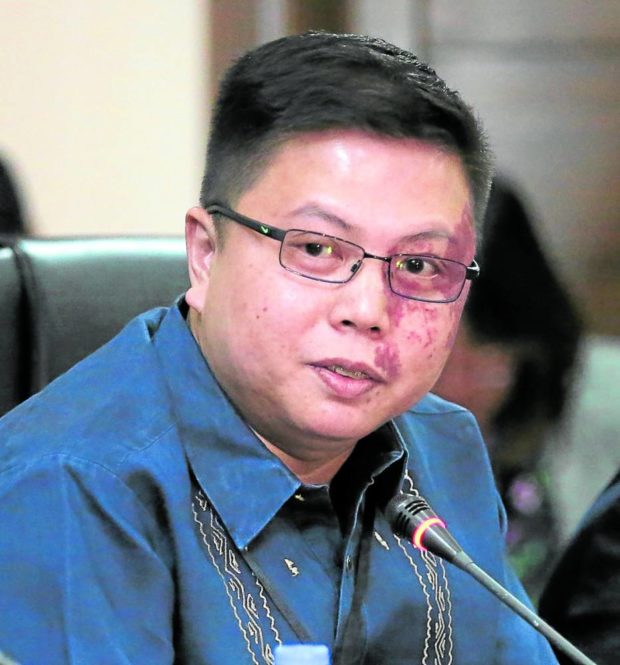Comelec disputes int’l group’s negatives claims about 2022 polls

FILE PHOTO: Commission on Elections (Comelec) acting spokesperson, Atty. John Rex Laudiangco.
MANILA, Philippines — The Commission on Elections (Comelec) has disputed claims from international monitors that the recently concluded 2022 general elections were far from being free and fair, saying that only vote buying remains unresolved.
In a press briefing, acting Comelec spokesperson John Rex Laudiangco said that while vote buying is still a problem, Comelec and its law enforcement partners are working aggressively to eradicate the practice.
Laudiangco called it a “bittersweet victory,” as even if the automated election system has increased confidence in the accuracy of the votes, human factor — or influencing voters to pick a specific candidate with money — is very much present, leaving voters’ decision open to manipulation.
“On the vote-buying incident, sabi po namin sa inyo when this automated election started, meron kaming parang bittersweet victory kasi habang tumataas po ‘yong level of confidence, habang naitataas namin ‘yong antas ng credibility ng eleksyon, the only thing that remains to be manipulated or vulnerable to these malefactors po ay ‘yong kaisa-isang may human factors,” Laudiangco said on Thursday.
(On the vote-buying incident, we told you before that when this automated election started, we had a bittersweet victory because while our level of confidence on the voting process and the level of credibility of the elections are increasing, the only thing that remains to be manipulated or vulnerable to these malefactors are those involving human factors.)
Article continues after this advertisement“That is the voters voting, and therefore, resulting to vote-buying. ‘Yan po, nasabi ko na rin po sa inyo na the Comelec, together with the other agencies had laid down Task Force Kontra Bigay, specifically to address this. Massive na rin po ‘yong aming info campaign on this,” he added.
Article continues after this advertisement(That is the voters voting, and therefore, resulting in vote buying. We have also told you that the Comelec, together with the other agencies had laid down Task Force Kontra Bigay, specifically to address this. Our info campaign has been massive.)
The Comelec spokesperson also urged people who have seen vote buying to provide evidence and help in filing cases as the poll body along with its partners are willing to trace and press charges against politicians who are believed to be engaging in the criminal act.
“And sana po ‘yon pong mga nakaka-alam ng incident, patuloy po namin kayong hinihikayat, please help us dahil we really are determined and we really have the intention to go after these people. Pagtulung-tulungan po natin, kasi po ang ebidensya na sa inyo,” he added.
(And I hope those who have witnessed the incidents themselves, we continue to encourage people to help us because we really are determined and we really have the intention to go after these people. Let us help each other, because the evidence is with you.)
Laudiangco’s statements were a reaction to the interim report of the International Observer Mission (IOM) — a group created by the International Coalition for Human Rights in the Philippines — which monitored several areas in the country for the May 9 elections.
READ: Int’l observers: May 9 PH vote falls short of free, fair election standards
According to the IOM report read out by Belgian parliament member Séverine De Laveleye, the election was “marred by a higher level of failure of the electronic voting system than ever before,” mentioning rampant vote-buying, red-tagging, election-related violence, and automated systems breaking down.
In response to the automated systems breaking down, Laudiangco said that only a small percentage of the vote counting machines (VCMs) malfunctioned, stressing that there were contingency measures placed to address the issues encountered on election day.
With regards to violence, he stressed that the Philippine National Police (PNP) only recorded 27 election-related incidents, adding that these happened from January 9 to May, and not only on May 9 itself.
“We had already stated again and again, out of the 106,174 machines for the 106,174 clustered precincts, only 900-plus or 915 malfunctioned, which were readily replaced with contingency, or were pulled out for repair. And it accounts for only 0.8 percent of the total,” Laudiangco said.
“In so far as the election(-related) violence are concerned, I read the statistics as vetted by the [PNP], the confirmed election-related incidents only numbers to 27 — significantly lower po sa lahat ng elections na naganap, for automated,” he added.
The IOM’s initiative to monitor the polls came amid recommendations from InvestigatePH in 2021. InvestigatePH has released several reports stating that impunity in the Philippines has become worse, with the government allegedly doing nothing to safeguard rights defenders.
READ: Gov’t doing nothing to preserve rights, represses activists instead – Investigate PH
After the election results came in, several supporters of the opposition slate claimed that massive fraud happened, citing several possible methods. However, a supposed 68:32 ratio for presumptive president Bongbong Marcos and his closest competitor Vice President Leni Robredo were debunked by University of the Philippines statisticians and the Parish Pastoral Council for Responsible Voting (PPCRV).
In an interview last Monday, PPCRV chair Myla Villanueva said that the focus of people should be on vote buying, and not the automated system which they believe is accurate.
READ: OCTA Research, Namfrel: No anomaly in alleged ’68:32 magic’